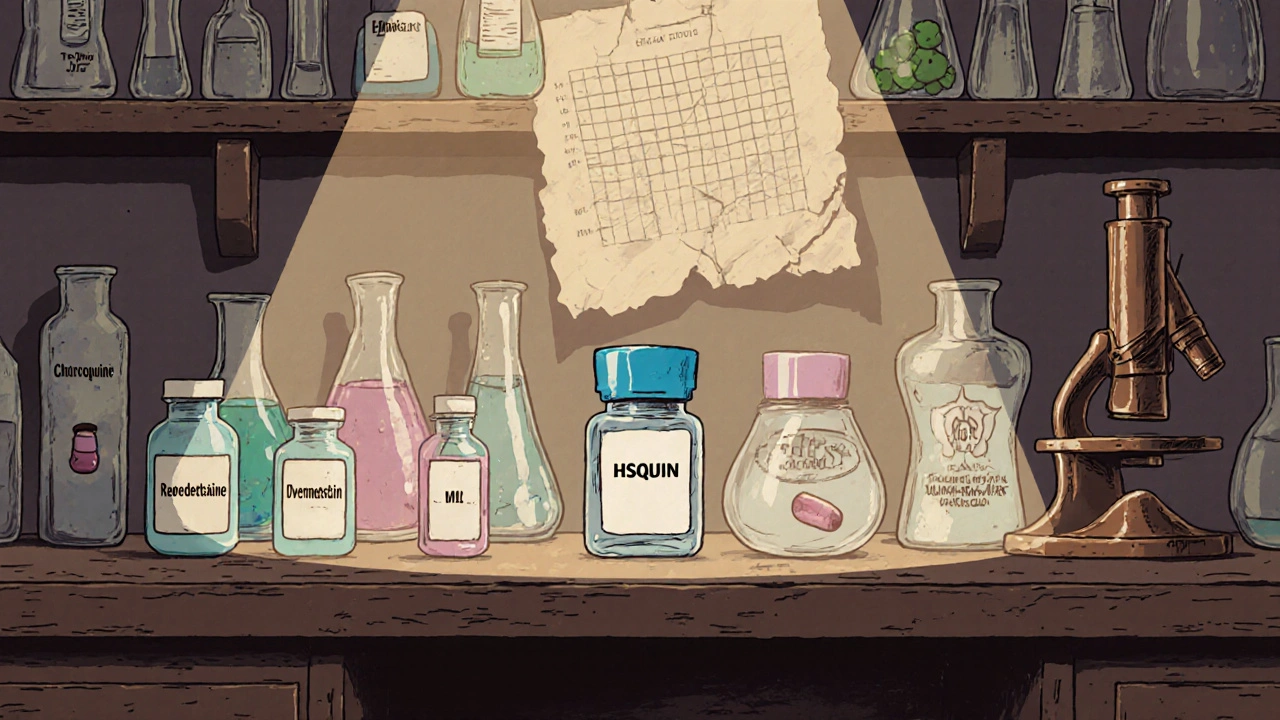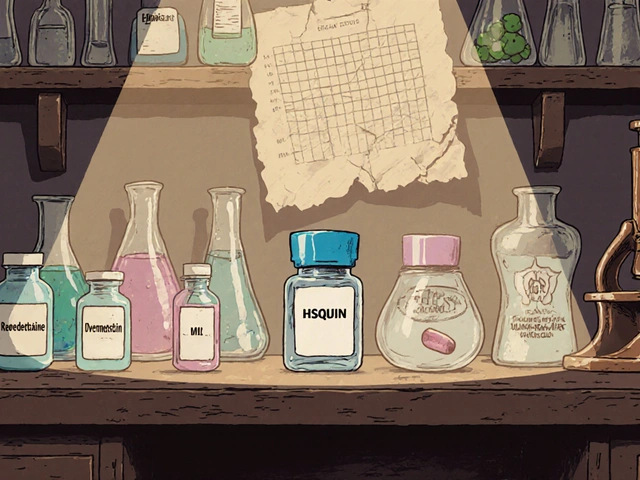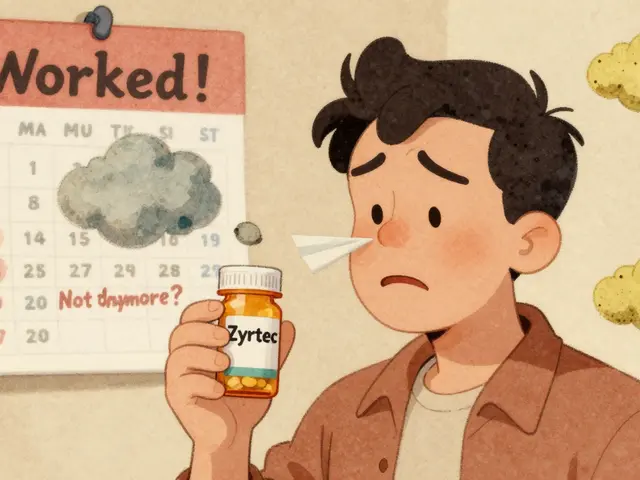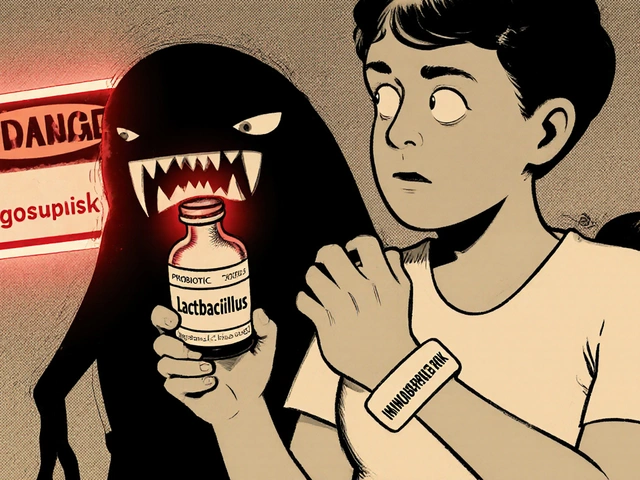COVID-19 Treatment Decision Tool
Select Patient Severity
Choose the severity level of the patient to see recommended treatments
When the pandemic first hit, a flood of drugs vied for attention. One of the most talked‑about names was Hsquin (the brand name for hydroxychloroquine). People wondered: does it really work, and how does it stack up against other options? In this guide we break down the chemistry, the clinical data, side‑effects and real‑world use of Hsquin and compare it side‑by‑side with the most common alternatives.
What is Hsquin (Hydroxychloroquine)?
Hydroxychloroquine is an antimalarial medication that also treats autoimmune diseases like lupus and rheumatoid arthritis. It works by raising the pH inside cells, which can interfere with the replication of certain viruses. Hsquin is simply a branded formulation marketed for off‑label use during the COVID‑19 crisis. The typical dose for COVID‑19 trials was 400mg twice on day1, followed by 200mg twice daily for four days.
Why compare it with alternatives?
Doctors and patients need a clear picture of benefits versus risk. Some alternatives target the virus directly, while others calm the immune over‑reaction that can damage lungs. Comparing efficacy, safety, cost and availability helps you decide what makes sense for a specific situation.
Key alternatives on the market
- Chloroquine an older antimalarial with a similar mechanism to hydroxychloroquine
- Remdesivir an antiviral that inhibits viral RNA polymerase
- Dexamethasone a corticosteroid that suppresses inflammation
- Ivermectin an antiparasitic that has shown mixed results in COVID‑19 studies
- Molnupiravir an oral antiviral that introduces errors into viral RNA
- Paxlovid a combination of nirmatrelvir and ritonavir, taken at home
- Azithromycin an antibiotic sometimes paired with hydroxychloroquine in early studies
Comparison table: efficacy, safety and cost
| Drug | Mechanism | Hospitalised‑patient mortality reduction | Common side‑effects | Typical cost (UK) |
|---|---|---|---|---|
| Hsquin (Hydroxychloroquine) | Endosomal pH rise | 0‑2% (no consistent benefit in large RCTs) | QT prolongation, retinal toxicity (rare), GI upset | ~£5 for a 5‑day course |
| Chloroquine | Similar to hydroxychloroquine | 0‑1% (limited evidence) | Cardiac arrhythmia, visual disturbances | ~£4 for a 5‑day course |
| Remdesivir | RNA‑polymerase inhibitor | ≈3% (shortens hospital stay) | Elevated liver enzymes, infusion reactions | £1,200 per 5‑day IV course |
| Dexamethasone | Corticosteroid anti‑inflammatory | ≈10% in patients on oxygen or ventilators | Hyperglycaemia, mood changes | ~£3 for a 10‑day regimen |
| Ivermectin | Parasite‑binding protein inhibition | Inconsistent; meta‑analysis shows no clear benefit | Dizziness, nausea, rare neurotoxicity | ~£6 for a 5‑day course |
| Molnupiravir | RNA‑error‑inducing nucleoside analogue | ≈3% reduction in hospitalization | Diarrhoea, headache | £550 per 5‑day pack |
| Paxlovid | Protease inhibitor + ritonavir booster | ≈15% reduction in severe outcomes | Altered taste, diarrhea, drug‑drug interactions | £500 per 5‑day pack |
| Azithromycin | Broad‑spectrum antibiotic, anti‑inflammatory | No mortality benefit when used alone | QT prolongation (when combined), GI upset | ~£8 for a 5‑day course |

How the data were gathered
We pulled results from three major sources:
- Randomised Controlled Trials (RCTs) published in The Lancet, NEJM and the WHO Solidarity trial.
- Real‑world hospital registries from the UK NHS and US CDC.
- Meta‑analyses released in 2024‑2025 that pooled smaller studies.
Only trials with at least 200 participants were considered for the efficacy column. Safety data focus on the most frequently reported adverse events.
Key take‑aways from the comparison
- Hsquin does not consistently reduce mortality or hospital stay. Large RCTs showed no statistical advantage over placebo.
- Dexamethasone remains the only drug with a clear mortality benefit for patients needing oxygen.
- Oral antivirals like Paxlovid and Molnupiravir are the most effective early‑outpatient options, but they are pricier.
- Remdesivir helps shorten length of stay but does not improve survival.
- Most alternatives have a better safety profile than Hsquin when used correctly.
When might Hsquin still be considered?
If a patient cannot access newer antivirals and the local guideline permits off‑label use, Hsquin could be a stop‑gap. It’s cheap and widely available, but doctors should monitor heart rhythm (ECG) because of QT‑prolongation risk, especially if combined with other QT‑affecting drugs like azithromycin.
Practical checklist for clinicians
- Confirm COVID‑19 diagnosis with PCR or rapid antigen.
- Assess disease severity: mild (outpatient), moderate (hospitalised, no oxygen), severe (oxygen/ventilator).
- For severe cases, start dexamethasone 6mg daily for up to 10days.
- If patient qualifies for oral antivirals and they are available, prescribe Paxlovid or Molnupiravir.
- Reserve Hsquin only when the above options are unavailable, and obtain baseline ECG.
- Monitor electrolytes and repeat ECG after 48hours.
Common misconceptions
Many still recall early news headlines that hailed Hsquin as a “miracle cure.” The reality is that early small studies were biased, and larger trials corrected the record. Another myth is that combining Hsquin with antibiotics like azithromycin boosts efficacy-no reliable data support this, and the combo raises cardiac risk.
Future outlook
Research continues on broad‑spectrum antivirals that could replace older drugs. Meanwhile, the WHO recommends focusing on proven therapies (dexamethasone, Paxlovid) and encouraging vaccination to prevent severe disease. Hsquin’s role is likely to shrink further unless new trials prove otherwise.
Frequently Asked Questions
Does Hsquin prevent COVID‑19 infection?
No. Studies on prophylactic use showed no reduction in infection rates compared with placebo.
Is it safe to take Hsquin with other heart medications?
Caution is required. Hsquin can prolong the QT interval, so combining it with other QT‑affecting drugs (e.g., certain antiarrhythmics, azithromycin) can increase the risk of dangerous arrhythmias. A cardiology review and ECG monitoring are advised.
How does Paxlovid compare to Hsquin in reducing hospitalisation?
Paxlovid cuts the risk of hospitalisation by about 15% in high‑risk outpatients, whereas Hsquin shows no statistically significant effect. The difference is substantial and supported by multiple phaseIII trials.
Can I use Hsquin if I have rheumatoid arthritis?
Hydroxychloroquine is already approved for rheumatoid arthritis, so the dose for that condition is typically lower and taken long‑term. Switching to a COVID‑19 regimen without medical supervision is not recommended.
What are the main side‑effects to watch for with Hsquin?
The most concerning is QT prolongation, which can lead to arrhythmias. Other common reactions include nausea, diarrhoea, and, with long‑term use, retinal toxicity (rare for a short COVID‑19 course).







Write a comment
Your email address will be restricted to us